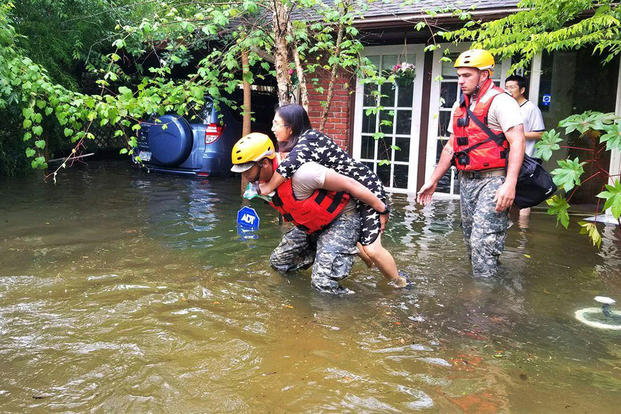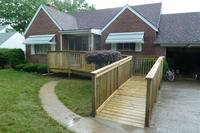If you experience a natural disaster, the VA has special guidance for the protection of you and your lender.
In the aftermath of a natural disaster like Hurricane Harvey, Veteran homeowners may experience significant financial distress. Homes may need new roofs. Victims may need to be hospitalized. Lives may be thrown into total disarray.
Thankfully, the Veterans Administration understands that natural disasters happen, and has created disaster relief guidance which helps VA lenders and borrowers work together to prevent VA loan foreclosure. In the wake of natural disasters, this program may ultimately allow more Veterans to keep their homes.
The category four disaster, Hurricane Harvey, hit Rockport, Texas at 10 pm on Friday, August 25, 2017, causing dozens of deaths and widespread damage. By September 1, 2017, the storm had dropped 50-inches of rain in some areas and was officially named the costliest natural disasters in U.S. history with an estimated $190 billion in damages.
The VA Encourages Lenders to Offer Special Relief to Disaster Victims
Texas which is the second-most populous state for Veterans, has a concentration of military families in Harris County, TX. The county, which includes Houston, is home to 171,858 Veterans, according to the US Census Bureau survey (2011-2015). It’s also home to the people hit hardest by the floods. It’s predicted that the Houston area will take years to recover from Harvey. But there is guidance from the VA, specifically intended for military homeowners, that provides answers for those affected.
VA home loan borrowers affected by severe flooding, landslides, and mudslides are encouraged to take measures with their loan servicers to get relief. Mortgage servicers and borrowers alike should be familiar with the VA’s Guidance on Natural Disasters to ensure Veterans get the assistance they need.
Under the VA’s guidance on natural disasters, lenders are encouraged to offer their VA borrowers special relief in the aftermath of disasters. Here’s what the VA suggests lenders do for borrowers affected by disasters:
- Extend forbearance
- Comply with moratorium on foreclosure
- Grant late charge waivers
- Suspend credit bureau reporting
- Recognize National Guard members
To find resources that can help you during a disaster, click here.
What is Forbearance?
The VA urges lenders and companies servicing VA loans to extend forbearance to borrowers in distress as a result of disasters. Some careful customer care can help determine whether the borrower’s troubles are a result of the disaster. Each company has authority to follow VA guidance which can make all the difference in whether a Veteran keeps his or her home. For example, a default can be turned around or prevented through a reapplication of prepayments. Additionally, a guaranteed loan can be modified without prior approval from the VA as long as conditions are met and your servicer agrees.
How Can a Foreclosure Moratorium Help?
Another way the VA guidance can help is through a moratorium on foreclosure. It’s the servicer’s call whether or not to initiate and go through with a VA loan foreclosure, and the VA asks servicers to wait at least 90 days from the date of a disaster before initiating any new foreclosures on loans in default due to major disasters. Questions about this should be discussed with the VA’s Regional Loan Center (RLC) of your jurisdiction, and with your servicer.
What is a Late Charge Waiver?
Late charges accrue when you miss a mortgage payment. The VA hopes loan servicers will waive any late charges on affected loans and encourages all servicers to adopt such a policy for any loans that may have been affected by Hurricane Harvey. If your ability to pay your mortgage has been impacted by a natural disaster, make sure to contact your loan servicer about potentially applying a late charge waiver.
Credit Bureau Reporting Explained
To avoid damaging a Veteran’s credit, VA mortgage servicers are asked to suspend credit bureau reporting on loans affected by a disaster. As a result, the VA will not penalize loan servicers for any late default reporting.
Why Special Recognition of National Guard Members is Important
Often during disasters, members of the National Guard are called upon to assist in recovery efforts. After Hurricane Harvey, National Guard members were deployed immediately to help the communities hardest hit. Typically, this type of emergency service calls for Guardsmen and women to work around the clock. Because of this, the VA encourages servicers to recognize, and extend special forbearance to, National Guard members with financial difficulties as a result of their service during the natural disaster.
Can VA Mortgage Counseling Help?
One of the many great attributes of VA loans is the free mortgage counseling borrowers can receive if they are struggling due to a disaster (or any other reason). The VA has proven methods in place to help you avoid foreclosure. In fact, both the VA and VA lenders have an interest in helping you stay on track. Why? Because foreclosure is expensive and time consuming and typically results in losses to everyone involved. In most cases, your servicer would much rather have your payments than your house.
Here are just some of the foreclosure alternatives the VA suggests for any borrower in trouble:
- Special forbearances or installment plans
- Additional time to arrange a private sale
- Repayment plans
- Loan modifications
- Short sales
- Deeds in lieu of foreclosure
What To Do if Your Home is Damaged in a Disaster
You have the best chance of keeping your home and getting the help you need by following these steps outlined by the VA:
- Contact FEMA
As soon as you and your family are out of harm’s way, contact FEMA to begin the disaster application process. Be sure to apply before the deadline expires to ensure you receive the maximum assistance available. Making contact within the posted time period also helps FEMA get you connected with all the agencies you need for disaster relief.
- Contact Your Loan Servicer
Next, get in touch with your loan servicer about any losses you’ve suffered as a result of the disaster. Keep in mind your servicer may or may not be the same lender who originated your loan. This is your chance to tell them if you can’t make payments on time, or to ask about forbearance or loan modification if that’s what you’re wanting. A good loan servicer will also be knowledgeable on subjects of insurance loss checks, repairs, payments to contractors, and more. Note: If you have a loan in process that wasn’t finalized before the storm, work directly with your loan officer to make sure you get the details right.
- Contact Your Insurer
Once you have things settled with your loan servicer, be sure to contact your insurance company. File claims quickly, but don’t feel rushed into a settlement. Have your home inspected for structural damage and start getting estimates from licensed contractors. If you get a check from your insurer for property damage, make sure it’s payable to both you and your loan servicer.
- Change Your Address
If you are no longer receiving mail at your old address, be sure to notify the US Postal Service and your VA Regional Office.
- Find Additional Assistance
Groups such as American Legion, Veterans of Foreign Wars, Disabled Americans, and others may offer special assistance—even to non-members.
Keep Up with the Ins and Outs of Military Life
For the latest military news and tips on military family benefits and more, subscribe to Military.com and have the information you need delivered directly to your inbox.




